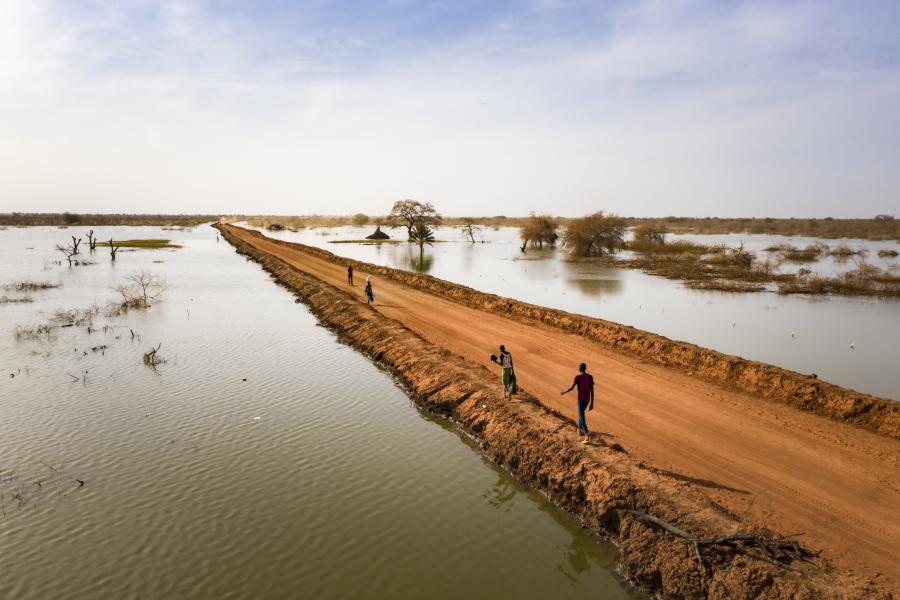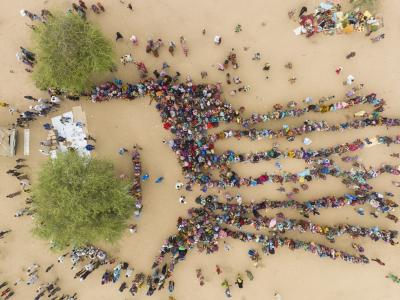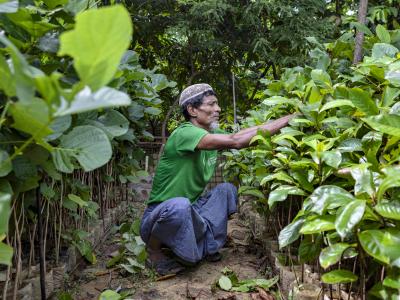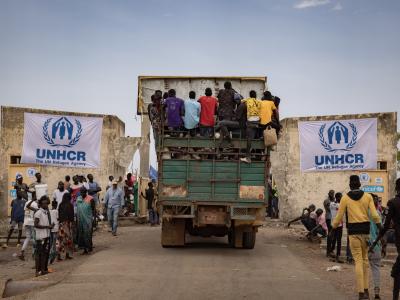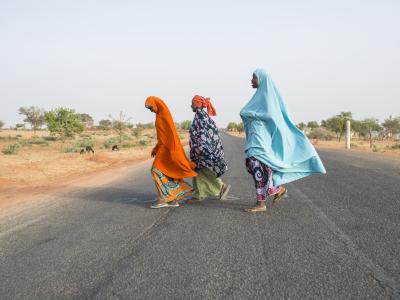By the end of 2023, 70% of refugees and asylum-seekers came from highly climate-vulnerable countries that are also least ready to improve their resilience.
The data also reveals a troubling reality for countries that are host or home to displaced populations: for displaced people, the impacts of climate, conflict and fragility converge in a complex landscape of crisis. At the end of 2023, almost three quarters of forcibly displaced people were living in countries with high-to-extreme levels of exposure to climate-related hazards. Nearly half of all forcibly displaced people were living in countries where they remained exposed to conflict as well as these climate-related hazards.
Climate change, and its associated protection risks, also presented a barrier to people trying to reach asylum and to people trying to end their displacement by integrating in their local area or returning to their home. In 2023, around 70% of people returning from conflict-related displacement returned to highly climate-vulnerable countries.
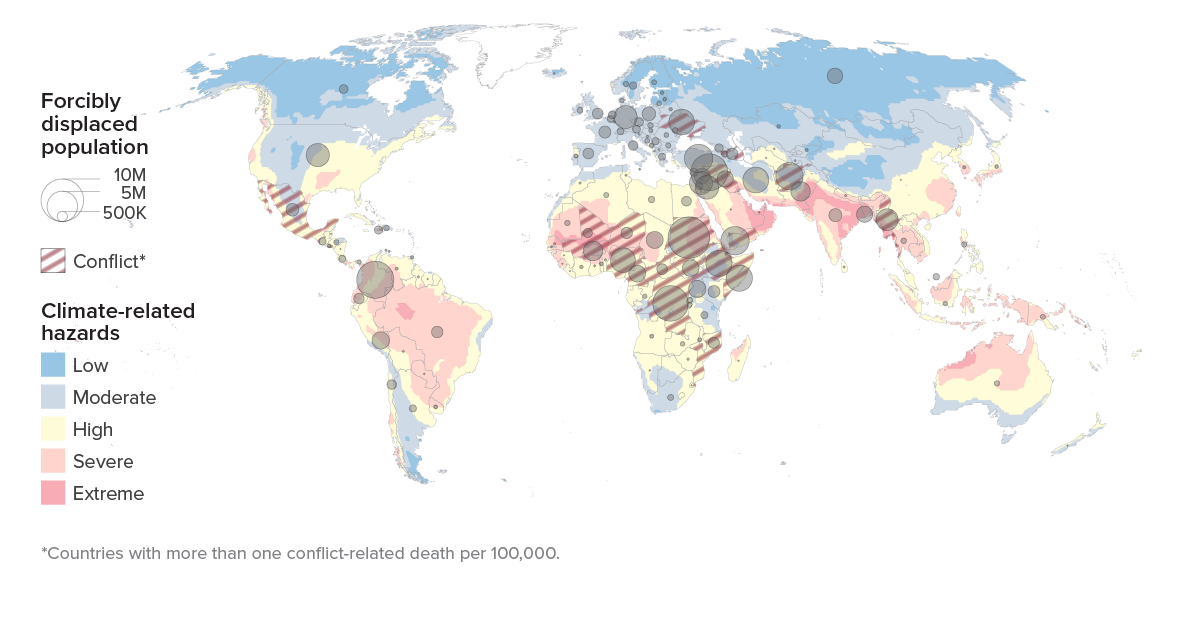
Figure 1: Climate-related hazards, countries with more than one conflict-related death per 100,000 (2022) and the number of forcibly displaced people per country (2023). Please refer to Global Trends for more analysis.
To ensure displaced people are protected, resilient, and able to find solutions despite the impact of climate change, UNHCR is ramping up its efforts on Climate Action. Building upon UNHCR’s “Strategic Framework for Climate Action’’ from 2021, UNHCR developed its new “Focus area strategic plan for climate action 2024-2030” in 2023, which reinforces UNHCR’s role in climate action, accelerating its global leadership in protection and its advocacy for the inclusion of forcibly displaced and stateless people in climate adaptation and resilience programmes.
Of the financial ask of $845.1 million for activities contributing to climate action, over $30 million was mobilized in 2023. In addition, over $60 million was raised in response to climate-related emergencies such as floods, cyclones, and drought, with the vast majority going towards a response to floods in Pakistan in early 2023. Contributions in 2023 were significantly higher compared to 2022.
Strengthening climate adaptation and resilience in UNHCR’s response
In 2023, UNHCR acted to make its operational responses greener and climate-smarter. Following the completion of the satellite imagery-based analysis of climate-related risks for 30 settlements in 15 of the most climate-vulnerable countries, UNHCR undertook a costing exercise for mitigation measures. To reduce risks related to floods, drought and deforestation, $860 million would be required across 25 refugee settlements accommodating 1 million people. The targeted investments would cover eight interventions to reduce climate vulnerability and improve community resilience, including: durable shelter, clean cooking, reforestation, flood and soil erosion mitigation, climate-smart water systems, solarization of boreholes and facilities, and infrastructure upgrades.
The Refugee Environmental Protection (REP) Fund, an innovative and sustainable financing mechanism to invest in reforestation and clean cooking in climate-vulnerable refugee-hosting communities worldwide, completed feasibility assessments in Rwanda, South Sudan, Sudan and Uganda. These confirmed the technical and economic viability of three sites in Rwanda and Uganda. A pilot target was set for nearly 14,000 hectares of reforestation, and 45,000 households served via clean cooking, for which initial upfront investments are estimated at $25 million ($15 million for reforestation and $10 million for clean cooking). Realizing the projects’ social and carbon benefits would be expected to draw in an additional $150 million in carbon financing.
UNHCR uses innovative technologies (real-time monitoring and internet of things) to foster environmentally sustainable water programmes. Through more than 100 smart water sensors specifically installed in boreholes, four settlements have their groundwater sources monitored in three country operations – Malawi, Nigeria and Uganda.
In 2023, UNHCR also continued its solarization efforts, with nearly half of UNHCR-run facilities running with solar-powered systems (50% of water pumps and 44% of health care facilities). An additional 38 water systems and 10 health care facilities were identified as feasible for solarization in Mauritania, Ethiopia, South Sudan, Sudan and Rwanda through “Project Flow”, which uses an innovative financing mechanism to cover upfront capital costs while the fund is replenished through fuel savings.
While progress is tangible, many areas remain in need of further financial support, particularly in the upgrades of ageing water and sanitation infrastructures (some in use for decades), provision of settlement-level flood mitigation measures, and further provision of solar systems for communal facilities. Feasibility studies for Project Flow indicated that just upgrading ageing water infrastructure for 600,000 people in the five countries served by the project could cost $4 million.
In 2023, UNHCR issued a new “Policy on emergency preparedness and response”, based on extensive consultations and lessons learned from recent emergencies. The new policy clarified the organization’s engagement in emergencies brought on or exacerbated by climate-related and other natural hazards, and emphasized the importance of taking strategic decisions on such engagement in the preparedness phase. These disaster-related provisions address the recommendations that arose from the evaluation of UNHCR’s response to the Cyclones Idai and Kenneth, and mark the first time that the organization’s emergency policy has provided guidance to its operations and regional bureaux on engaging in natural hazard and climate-related displacement.
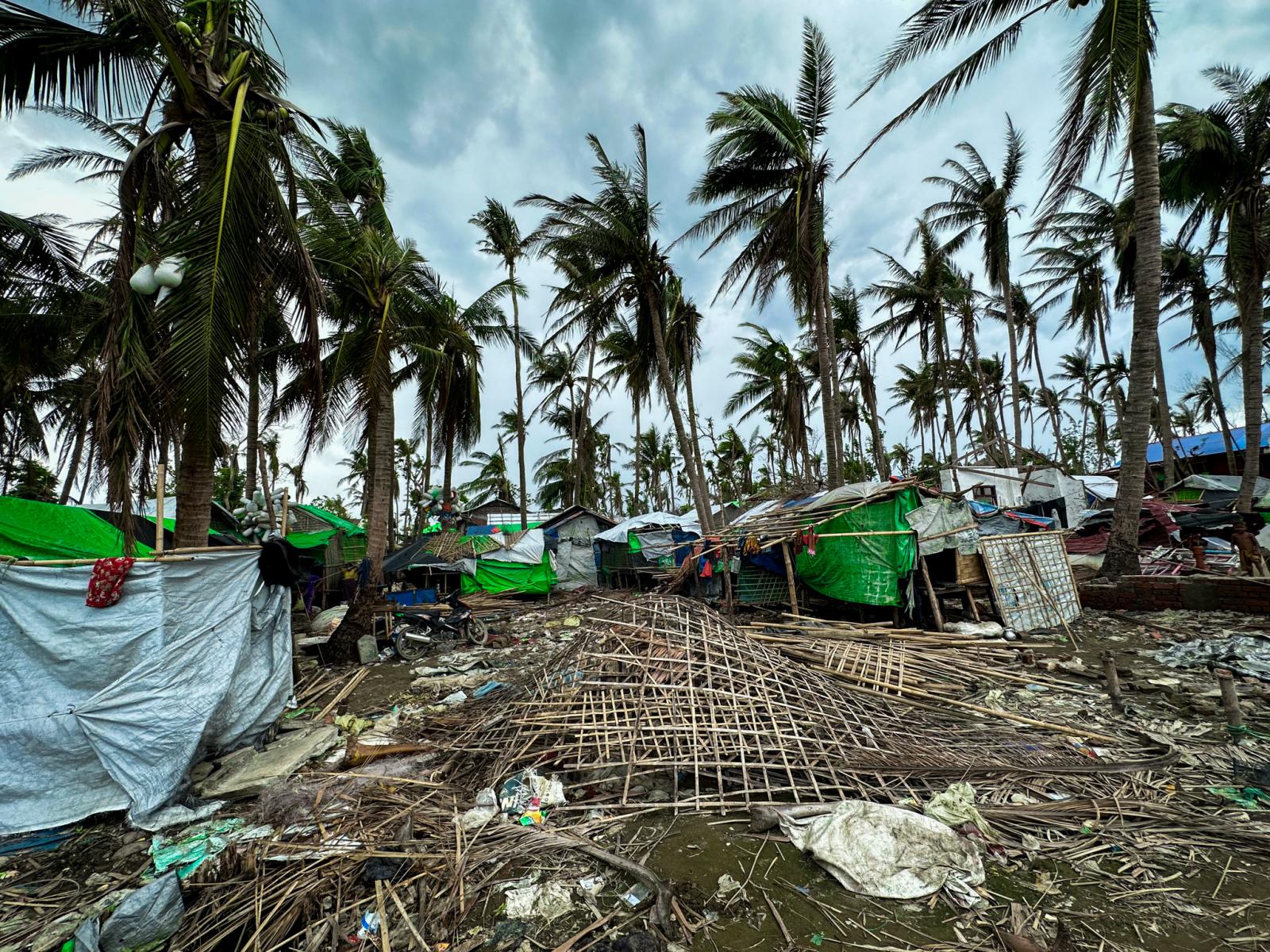

Spotlight on emergency response
On 14 May, Cyclone Mocha made landfall in Myanmar’s Rakhine State. Around 10.2 million people in Myanmar and Bangladesh were residing in areas affected by the cyclone, including 930,000 Rohingya refugees in Cox’s Bazar. Refugee camps in Bangladesh were severely affected, with extensive damage to shelters, water and sanitation facilities, and infrastructure such as registration sites.
In response, UNHCR and partners provided protection services and prioritized support to over 4,500 households with severely damaged shelters, and provided labour support to extremely vulnerable households. In Myanmar, UNHCR provided emergency shelter supplies and disseminated protection and safety messaging.
Strengthening law and policy
At the 28th United Nations Climate Change Conference (COP28) UNHCR’s technical support, policy engagement and advocacy alongside refugees, IDPs, governments and multiple partners contributed to the inclusion of displacement in the first Global Stocktake, which guides stronger national commitments and the recognition of displacement and displaced people in the scope of the new loss and damage fund. As the new board of the fund gets to work, ensuring the inclusion of displaced populations will be important to its delivery for frontline communities. UNHCR also contributed to the development of the “COP28 Declaration on climate, relief, recovery and peace”, and signed onto its call for scaled up action, finance and support to vulnerable and conflict-affected countries, with specific recognition of displaced and host communities.
In fulfilment of its supervisory role over the implementation of the international refugee instruments and as per its protection mandate, UNHCR continued to provide legal guidance on application of existing instruments for the protection of people displaced across borders in the context of the adverse effects of climate change and disasters. To clarify the situations where international refugee law will be applicable and may give rise to international protection needs, a paper was issued on "Climate change impacts and cross-border displacement: International refugee law and UNHCR’s mandate". This paper built on UNHCR’s 2020 guidance on the topic and provided illustrative examples where international protection needs arise under the 1951 Convention, regional refugee law treaties and human rights law. UNHCR also submitted a report on the human rights implications of climate change displacement to the UN Special Rapporteur on Climate Change.
Throughout 2023, UNHCR also conducted a research project to explain the links between climate change impacts and the application of existing refugee instruments, notably the wider OAU refugee definition and its criterion related to “events seriously disturbing public order”. In 2023, an initial legal paper was published on “Assessing serious disturbances to public order under the 1969 OAU Convention, including in the context of disasters, environmental degradation and the adverse effects of climate change”. This research aims to provide solid hands-on analysis in view of the development of legal guidance on the application of the OAU Convention for the protection of people displaced across borders in the context of the adverse effects of climate change and disasters.
During the Global Refugee Forum, UNHCR and the Platform on Disaster Displacement jointly issued a policy brief on ''Protection of persons displaced across borders in the context of disasters and the adverse effects of climate change'', highlighting good practices to support the Global Compact on Refugees in the context of climate change.
In 2023, UNHCR continued to advocate and provide technical support for the development and adoption of laws and policies to advance prevention, protection and solutions for internally displaced people in the context of disaster and climate change, including in the Philippines, Somalia, Nigeria and Cameroon. A significant positive development was the adoption in Chad of a law on internal displacement domesticating the African Union's “Convention for the protection and assistance of Internally Displaced Persons in Africa” (the “Kampala Convention”) in May, strongly supported by UNHCR and its protection partners in recent years. UNHCR conducted a series of workshops at national and local level to raise awareness among different stakeholders about the newly adopted law, also advocating for the adoption of implementing regulations.
In Malawi, UNHCR and its protection partners supported the development of the “Disaster risk management Act, 2023”, strengthening protection-sensitive provisions on issues such as relocation and protection of children and vulnerable adults in evacuation centres.
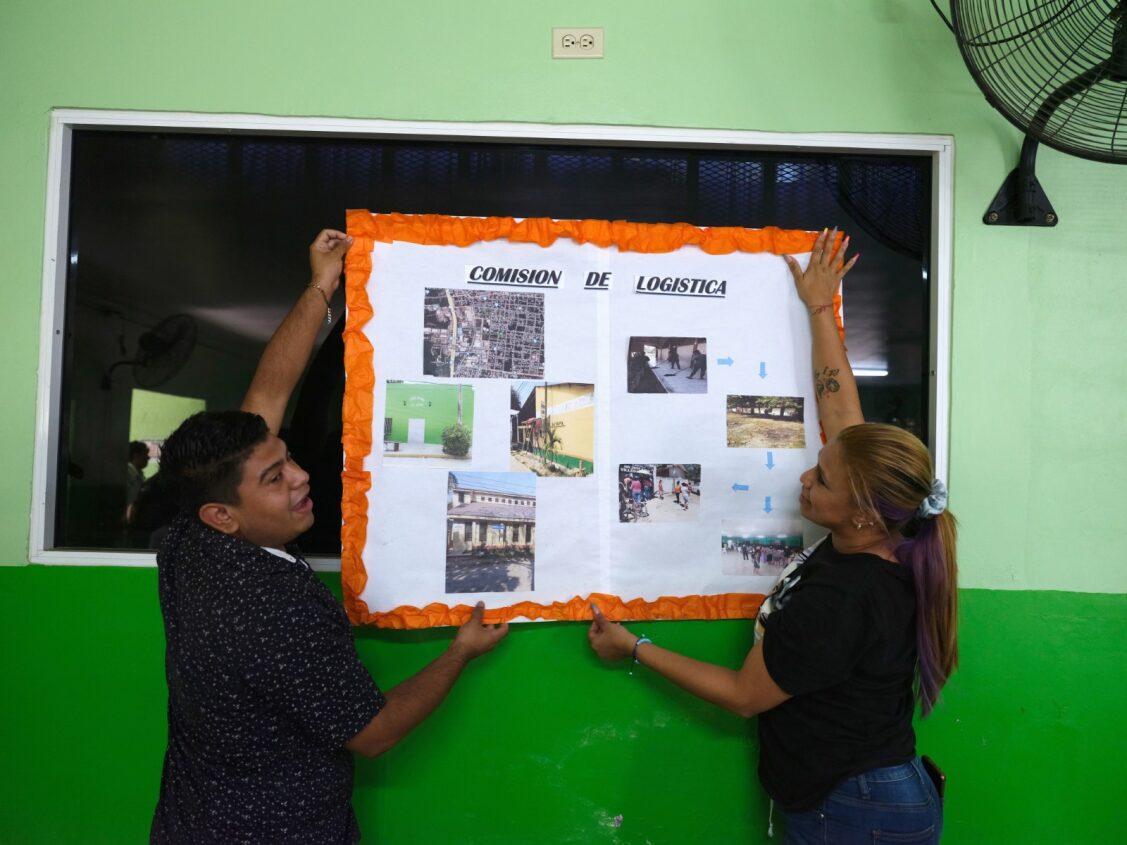

Spotlight on preparedness
After experiencing huge losses and displacement from Hurricanes Eta and Iota in November 2020, including widespread flooding that destroyed and swept away houses, a community near San Pedro Sula in Honduras realized that the safety and security situation would only worsen as climate change made such events more frequent and extreme. They resolved to get organized and start working together to prevent and respond to future disasters.
UNHCR and Children International were already working with communities in San Pedro Sula to prevent displacement caused by violence. Following the hurricanes, both organizations began supporting communities near the city to work on action plans, should disaster strike again. Residents began by working closely with the local government and the Honduran Red Cross to form several committees made up of local volunteers, each one focused on a different aspect of preventing and responding to a disaster.
Building evidence and data
UNHCR supported the development of an “IGAD climate adaptation strategy (2023-2030)” under the leadership of the IGAD Centre of Excellence for Climate Adaptation and Environmental Protection (IGAD-CAEP), together with a consortium of world leading research institutes, to ensure the meaningful inclusion of displaced and stateless people in adaptation planning and programming from the start. The strategy established an innovative framework for accelerating regional collaboration and bolstering local communities and groups in particularly vulnerable situations, including displaced populations and their hosts.
UNHCR supported IGAD-CAEP in developing an integrated assessment of economic, social, cultural and environmental losses and damage resulting from the adverse effects of climate change in Somalia. The assessment included extensive references to the specific vulnerabilities and needs of refugees and displaced people, informing policymakers, donors, community leaders and others about the need for dedicated resourcing, evidence-based decision-making and targeted interventions to avert, minimize and address displacement as a form of loss and damage.
Building on the community of practice of 20 leading academic institutions working on strategic foresight and predictive analytics established for the Sahel Predictive Analytics Project, UNHCR began collaborating with CGIAR to better understand and utilize climate hazard data tailored to displacement contexts with the aim to anticipate, prepare for, and respond to current and future climate-related risks, particularly in fragile and conflict-affected areas. The resulting maps and evidence have informed internal capacity-building and guided our strategic planning and prioritization, including the development of the “Focus Area Strategic Plan for Climate Action 2024-2030” and regional plans.
Greening UNHCR
UNHCR is on track to reduce its own direct environmental footprint and greenhouse gas emissions by at least 30% by 2030, from a 2010 baseline, a revised target. In 2023, UNHCR achieved climate neutrality for 2022 through offsets for a fifth year running. The organization forged ahead with installing Green Boxes, which remotely monitor UNHCR offices’ electricity use. By the end of 2023, 97% of UNHCR’s offices had installed Green Boxes, up from 92% at the end of 2022. 95% of UNHCR’s offices also took part in the annual UN-wide “Greening the Blue” reporting survey, an increase on the already impressive 85% that took part the previous year.
In 2023 UNHCR’s progress towards emissions reduction achieved a number of milestones, including the establishment of five global commercial agreements for the provision of solar services and the completion of energy assessments in 75 offices across 20 of the largest operations. 14 offices have already entered into contracts for solarization. The solar projects supported to date by the Green Financing Facility are expected to save UNHCR an average of 20% on previous fuel-related energy costs and 50% in CO2 emissions per year. UNHCR published an independent mid-term evaluation of the Green Financing Facility in 2023.
UNHCR has rolled out a UN-wide ride-sharing scheme in 107 offices in 21 countries. A vehicle tracking system has been installed in 88% of UNHCR’s fleet, allowing for the use of satellite data to calculate emissions.
UNHCR made significant progress in optimizing its end-to-end supply chain in 2023. It modified the product specifications for two additional high-emitting core relief items – solar lamps and kitchen sets – meticulously addressing their contents, manufacturing processes and packaging. The organization has already transitioned to sourcing blankets and sleeping mats exclusively made of 100% recycled plastic. As stocks are replenished with greener items, UNHCR is well on its way to surpass the initial target of a 20% reduction in its carbon emissions from core relief items by 2025. Furthermore, in a collaborative effort alongside humanitarian partners, UNHCR launched a call to action for a sustainable humanitarian supply chain at COP28, marking a significant milestone in our collective pursuit of greener solutions.
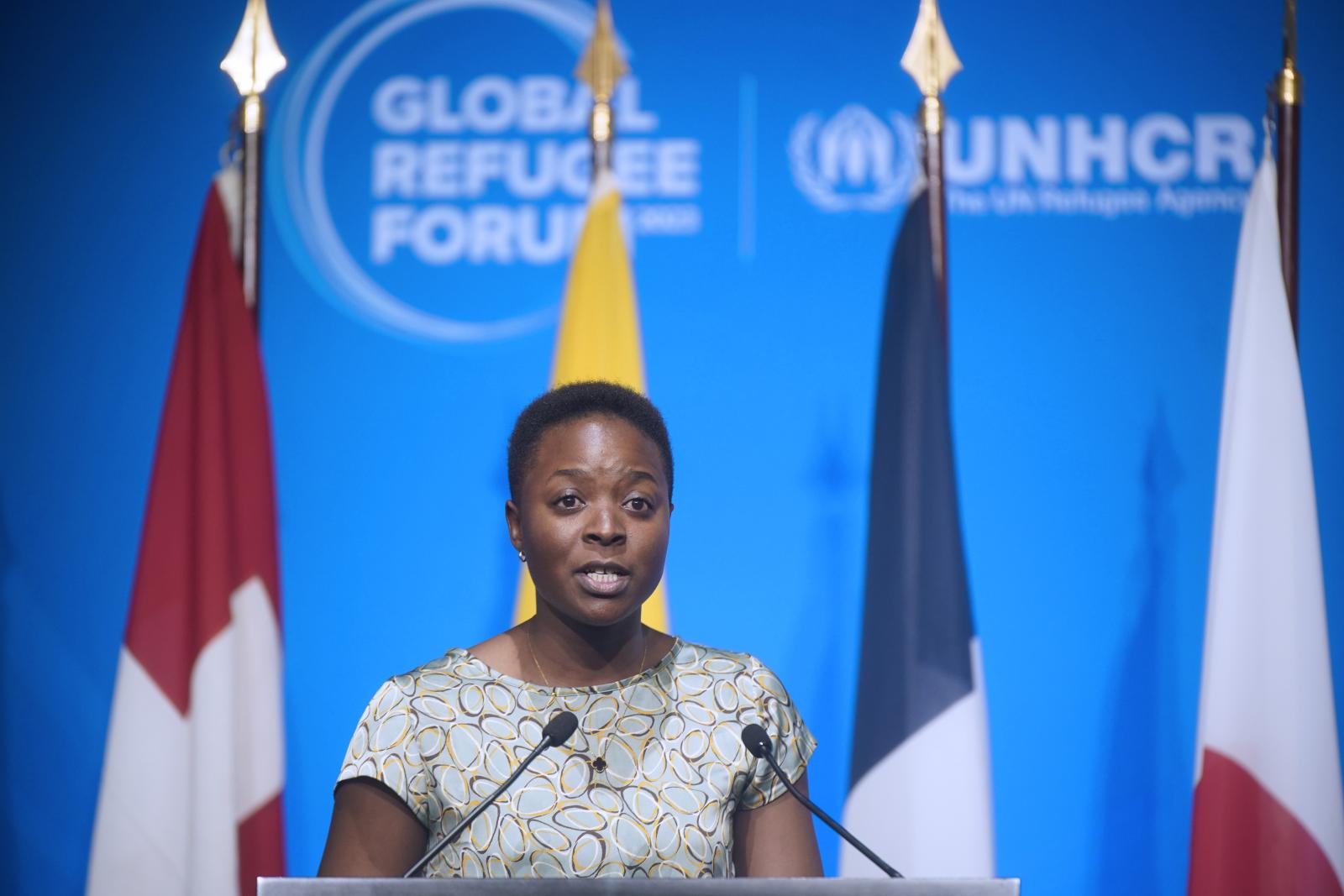

Global Refugee Forum pledge on climate action
Countries hosting refugees are providing a global social good, while the costs and responsibilities they shoulder grow heavier due to climate change. Urgent action is required to improve access to climate action, including capacity-building and financing, for hosting developing countries and communities in climate-vulnerable, fragile and conflict-affected settings and to ensure that refugees and other forcibly displaced and stateless people living in these settings receive comparable support for climate action as nationals, through their inclusion in all relevant laws, policies, plans and programming. Against this background, the second Global Refugee Forum, saw governments, NGOs and stakeholders coming together in a multi-stakeholder pledge on climate action. This commitment aims to strengthen the protection, preparedness and resilience of forcibly displaced and stateless people and their host communities to climate impacts now and in the future.
In general, underfunding for basic services exacerbated the vulnerability of refugee populations to the adverse impacts of climate change. Given an already strained financial situation, UNHCR's capacity to implement proactive measures to address the impacts of climate change on displaced populations has diminished. Without sufficient resources to build resilience and mitigate risks, refugees become more susceptible to renewed displacement, loss of livelihoods, food insecurity, and health-related issues heightened by climate-related hazards.

Postcode Lotteries save lives and cut emissions
The Postcode Lotteries in the Netherlands, Sweden and Germany maintained their valuable unrestricted contributions to UNHCR with a total of $9 million donated to UNHCR last year. During the 2023 Global Refugee Forum, they also demonstrated their ongoing commitment and advocacy for refugees through their trust-based way of supporting charities. The Swedish Postcode Lottery also granted UNHCR a $1.3 million project in the United Republic of Tanzania focusing on solarizing 14 health centres in refugee camps and host communities.
Another highlight was the attendance of UNHCR Goodwill Ambassador Yusra Mardini at the German Postcode Lottery's annual charity gala, where she received €1 million in additional funding for the victims of the earthquakes in the Syrian Arab Republic and Türkiye.
